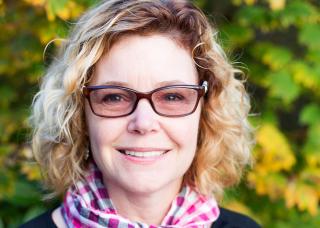A new take on the classroom builds space for better learning


The next time you step into a classroom at UBC, you might be surprised by what you see.
At first glance, you might not even realize you’re in a classroom; however, it’s likely that you’ve simply entered one of UBC’s new learning spaces, planned by Jodi Scott and her team in Infrastructure Development, Facilities Planning.
“We’re challenging the way that teaching and learning happens here through the use of space,” says Jodi, who has been with UBC since 2002 and is a senior planner at the university.
Indeed, as you walk further into one of these new learning spaces, such as those used by Vantage College in the Orchard Commons building, you’ll notice the classroom doesn’t look like the lecture-style theatre you might have been expecting. For example, students seated in a lounge area may be engaged in discussion about a class topic, while other groups of students work together on projects at small moveable tables, streaming content from their devices to large digital displays in the room.
“These new rooms are set up so that students have a chance to talk, to walk around, and to learn not only from the instructor, but from each other,” Jodi explains. “It’s so exciting to see this shift from the traditional classroom setting.”
We’re challenging the way that teaching and learning happens here through the use of space.
Jodi Scott
Developed with a view to the university’s Flexible Learning Initiative, many of the spaces that Jodi and her team work on allow for what’s known as the flipped classroom – a model where students read or watch instructional material before class, and then use class time to apply concepts through group activities and discussion.
“Research shows that students who are engaged and have more of an active learning experience have better outcomes,” says Jodi. “These spaces really allow for the students to take a more hands on role.”
For example, a 2011 study at UBC showed that students in an interactive physics class did nearly twice as well in a test designed to determine their grasp of complex physics concepts.
It’s not just students who are benefiting, she adds: “Instructors tell us they love these new rooms – their students don’t have to strain to turn around in the seats for group discussion, and the instructor can easily move around to check on different groups.”
For Jodi, she sees her work as a way to bring people together – be it students engaged in peer-to-peer learning, or the staff and faculty who join working groups to collaboratively plan these learning spaces when a building is constructed or renovated.
In a way, the spaces Jodi helps plan could be seen as a metaphor for how she approaches her work more broadly.
“One of the things I’ve learned at UBC, is that if you want to get things done, it’s really helpful to connect with as many people as possible,” she says.
It’s a sentiment that has led her to find even more ways of making connections through her work, including volunteering as the campaign co-chair for UBC’s annual United Way campaign, which she has been involved in since joining the university.
“When faculty, staff, and students at UBC participate in a United Way event, it’s to support a good cause. But it’s also a time for people to come together at the university, and to meet other people,” says Jodi.
Ultimately, Jodi sees that the best results are achieved when people are able to help each other – in the classroom, at work, and in the community.
“We have to be helpful in this big, big place,” she notes. “That’s what I think we’re meant to do here, and I’m proud to be part of making that happen.”
Update: In May, 2017, Jodi Scott was recognized with the President’s Service Award for Excellence. Learn more.
One of the things I’ve learned at UBC, is that if you want to get things done, it’s really helpful to connect with as many people as possible.
Jodi Scott
Find the latest news, updates, events, and useful dates from across UBC, curated for faculty and staff by Internal Communications.
Access a library of resources from multiple UBC websites, all in one place.